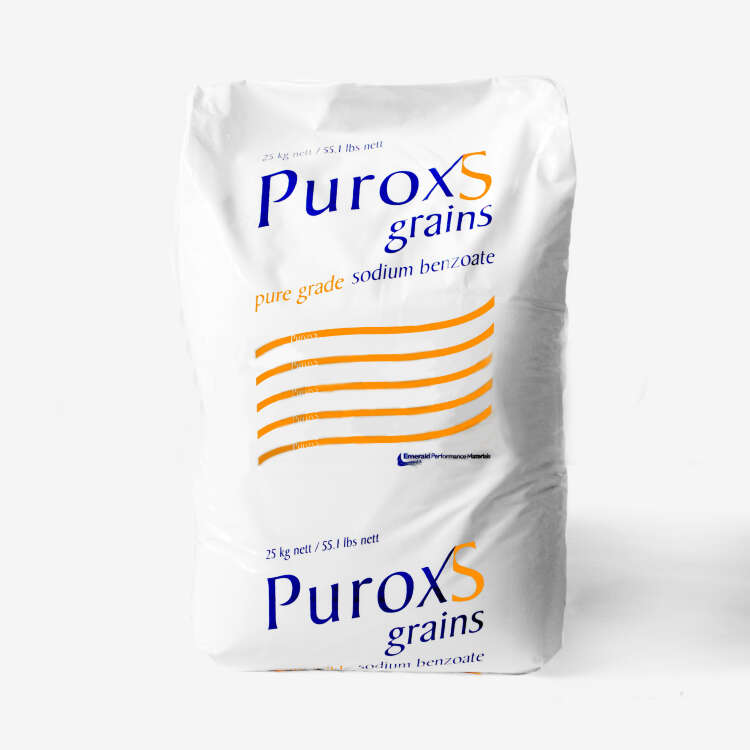Sodium Benzoate Purox S Е 211
Property Descriptions
Sodium benzoate E211 has a chemical name - sodium benzoate and the formula C7H5O2Na.It is a food preservative. Traditionally, sodium benzoate is available in three commodity forms: in the form of powder, flakes and granules. In 100 g of water at room temperature, it dissolves 63 g. The powder dissolves the fastest, but it is very dusty, so special protective equipment must be used when using it. In addition, the powdered product is difficult to dose due to its low flowability. Flakes and granules, on the contrary, are devoid of this disadvantage and do not stick to the walls of the equipment, but their dissolution rate is low. In order to eliminate these disadvantages and combine the advantages inherent in various forms of sodium benzoate, the specialists of the DSM Special Products B. V. concern (Holland) developed a special technological process and, since 2002, launched the production of a completely unique product distributed under the Purox S trademark. It is exceptionally pure (99.99%) sodium benzoate, which is homogeneous balls formed from very small particles (like instant coffee). The product has excellent solubility, perfect flowability and absolutely does not dust. In March 2011, the Purox S factory was purchased by the American company Emerald Kalama Chemical.
Sodium benzoate has long been allowed in most countries for the preservation of many foods. Its maximum permissible concentrations range from 0.15 to 0.25%. The action of sodium benzoate is mainly directed against yeast and mold fungi. Bacteria are only partially suppressed. Taking it in small (subthreshold) concentrations does not lead to the appearance of resistance to it.
Technological recommendations
Sodium benzoate has been used as a preservative in the production of various food products for several decades. So in the manufacture of margarine, mayonnaise and delicatessen products containing mayonnaise, it is added to the aqueous part of these products. Usually sodium benzoate is used here in combination with potassium sorbate. This mixture has a stronger effect on lactic acid bacteria than each component separately. Sodium benzoate is a good preservative for sour fruit products. It protects fruit pulp from mold and fermentation. The same is true for the preservation of pure fruit juices, especially those intended for further processing. To inactivate enzymes and reduce the total number of microorganisms, the product is additionally pasteurized. In soft drinks, sodium benzoate serves as an additional inexpensive protection factor against yeast. It is used as a preservative in pharmaceuticals, in the production of hygienic and cosmetic products, for example, toothpastes, shampoos, gels. In the tobacco industry, sodium benzoate is used to prevent mold formation of smoking and chewing tobacco varieties. As an inhibitor, sodium benzoate is added to the cooling fluids of automobile engines.
The stage of introducing a preservative into a product is determined by its production technology. The optimal moment is considered immediately after pasteurization or sterilization, when the level of contamination with microorganisms decreases as a result of heat treatment, and the addition of a preservative allows it to be preserved for a long time. When developing a specific formulation for the application of sodium benzoate, the following should be taken into account:
the more acidic the product, the less preservative should be added to it;as a rule, low-calorie foods have a high water content and are easily damaged, so the amount of preservative added to them should be 30-40% more than recommended for conventional products;if the technological process involves prolonged boiling, it is necessary to increase the dosage of sodium benzoate, because it may partially evaporate with steam.
The following are the approximate doses of sodium benzoate in various foods:
- Margarine* – 60
- Margarine – 100 - 120
- Mayonnaise, ketchup, sauces – 160
- Melange – 70
- Fish preserves – 120
- Herring, sprat – 260
- Fish caviar – 100 - 200
- Canned vegetables – 120 - 240**
- Fruit semi–finished products - 120 - 240
- Confectionery products – 50 - 70
- Soft drinks – 20 - 70
- * — joint use of benzoic acid and sodium benzoate
Specifications
| Sodium Phthalate % | max. 0.005 |
| Polycyclic acids | passes the test |
| Organic impurities | passes the test |
| Oxidized substances ml 0.02molKMnO4/g | max. 0.1 |
| Turbidity (10% aqueous solution) NTU | max. 0.5 |
| Total chlorides, ppm | max. 75.0 |
| Halogenated compounds, ppm | max. 25.0 |
| Taste and smell | passes the test |
| Insoluble substances | passes the test |
| Alkalinity mg HCl/g | max. 0.37 |
| Acidity mg NaOH/g | 0,00-0.40 |
| Chromaticity (10% aqueous solution) ALPHA | 0-10 |
| Drying losses % | max. 0.1 |
| Product Content % | 99,9-100 |
| Iron, ppm | max. 1.0 |
| Heavy metals (as Pb), ppm | max. 10.0 |
| Mercury, ppm | max. 0.1 |
| Chlorides, ppm | max. 50.0 |
| Sulfates, ppm | max. 50.0 |
Didn't find the required product? Do you have any questions?
If you have any questions about the availability and assortment of goods, or other questions, you can call us by phone +7 (4212) 476-887, +7 (924) 208-4800, +7 (924) 305-4785.
Or just leave a request. We will contact you and give you an answer.



